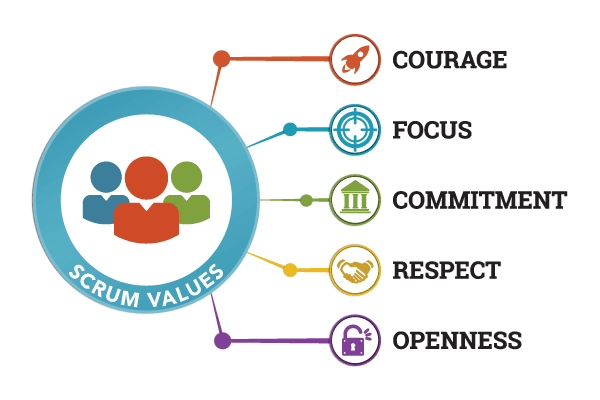The Scrum Values
Values and the Scrum Values
Values
Values are the principles we view as important in the way we live and work. They are the core beliefs that guide our actions, behavior and decisions. Examples of personal core values may include: family-first, honesty, kindness, patience, authenticity and many others. Understanding our personal values helps us understand what’s important to us. Using our values to guide our behavior, actions and decision-making provides us a sense of direction and purpose.
The Scrum Framework articulates a set of Scrum Values to help guide the work, actions and behavior of Scrum Team members.
The Scrum Values
The Scrum Values are:
- Courage - Scrum Team members need courage to do the right thing and face tough problems. For example, they should exhibit courage to explore the unknown, to change direction, to share information and to engage in courteous disagreements.
- Focus - The Scrum Team focuses on the work of the Sprint and its goals. Examples of this include focusing on: creating value, what’s currently most important and getting to Done.
- Commitment - Each Scrum Team member commits to achieving the team’s goals and to support each other. This involves commitment or dedication to:
- Delivering value;
- Quality;
- Working toward the Sprint and Product Goals;
- Using empiricism.
- Respect - It’s necessary for Scrum Team members to respect each other as skilled professionals. Scrum Team members should respect each other's differing expertise and perspectives and be respectful when they disagree.
- Openness - The Scrum Team and its stakeholders agree to be open about all of the work and the challenges with performing the work. Scrum Team members should be open about the struggles they face. They should share feedback and learn from each other and from their stakeholders.
Each of the Scrum Values may be interpreted by each team member differently. Language and cultural differences may contribute to this. Gunther Verheyen, a Professional Scrum Trainer created a well-regarded description of the Scrum Values. On thescrumvalues.org you’ll find this description and its translation into over two dozen different languages.
We recommend that Scrum Teams routinely collaborate on what the Scrum Values mean to their team. Scrum Teams should explore what these values mean to each individual on the team and collaborate on how these values can work on a team level. The following blog provides an example of how to conduct a Scrum Values workshop.
The Importance of Living the Scrum Values
The Scrum Team accountabilities, events and artifacts provide structure for practicing Scrum. Some practitioners mechanically follow this guidance without adopting an agile mindset. They tend to gloss over the Scrum Values and dismiss them as being emotional and unbusiness-like. These teams tend not to: discuss the Scrum Values, learn how each member of the team defines the Scrum Values, nor do they apply the Scrum Values as they work together. These teams do not practice Professional Scrum.
Scrum and an agile mindset, requires a shift away from command-and-control style corporate behaviors. The Scrum Values provide support for this mindset shift and foster an environment of support, professionalism and trust necessary for practitioners to practice Professional Scrum. The Scrum Values:
- Help create an environment of psychological safety that is necessary for empiricism to thrive
In traditional environments, it’s typical to assign blame when things don’t go as planned. However, in Scrum we understand that complex problems can only be solved by experimentation and we cannot plan our way to the solution. The essence of experimentation is to create a hypothesis, and either prove or disprove it. A great deal of knowledge is gained when a hypothesis is disproved. Scrum Team members must trust that they will be supported, not blamed, when an experiment doesn’t support their hypothesis.
- Provide a guide for decision-making
When faced with several difficult choices, it’s helpful to lean on the Scrum Values to help assess whether each choice is in alignment or not.
- Support strong team dynamics
The Scrum Values help guide interpersonal interactions among Scrum Team members to be healthy and supportive. This helps team members feel motivated and supports an environment of creativity.
Resources:
Why Scrum Masters should promote and live the Scrum Values:
The Scrum Values promote an environment of trust and psychological safety:
A Case Study of the Scrum Values in Action:
The Scrum Values play an important role in Professional Scrum:
